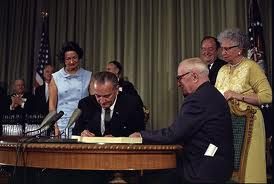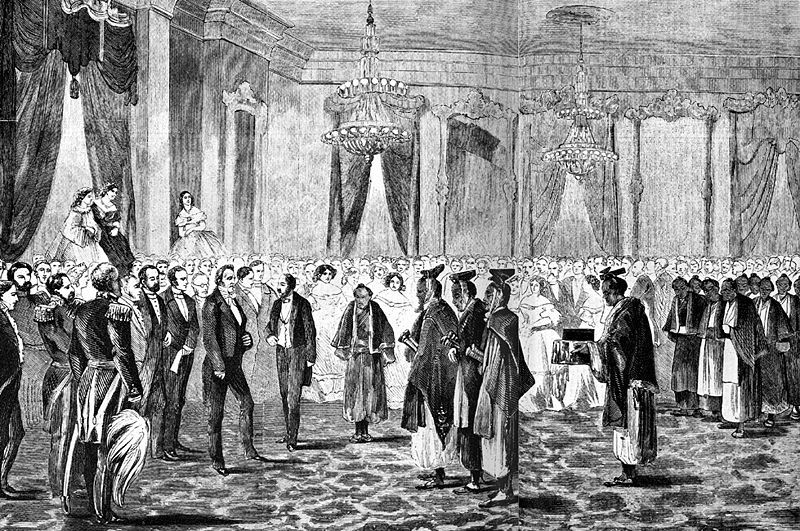“Punting the Pundits” is an Open Thread. It is a selection of editorials and opinions from around the news medium and the internet blogs. The intent is to provide a forum for your reactions and opinions, not just to the opinions presented, but to what ever you find important.
Wednesday is Ladies’ day. Scroll down for the Gentlemen.
Thanks to ek hornbeck, click on the link and you can access all the past “Punting the Pundits”.
Katrina vanden Heuvel: The GOP’s state-by-state crusade to disenfranchise voters
With only a week left before the United States of America could default on its debt, it’s easy to look at the federal government and wonder how we ever made it this far. Who would have guessed that a committed gang of extremists could bring down the economy? And yet, that’s where we find ourselves today, cornered by a manufactured crisis and running out of time. As Larry Sabato rightly tweeted over the weekend, “For anybody who teaches the American system and believes in it, this has been an extremely discouraging week.”
Unfortunately, the assault on our democracy is not confined to Congress or the standoff over the debt ceiling. It is also seeping into the states, where voting rights – the fundamental underpinning of any democracy – are being curbed and crippled.
In states across the country, Republican legislatures are pushing through laws that make it more difficult for Americans to vote. The most popular include new laws requiring voters to bring official identification to the polls. Estimates suggest that more than 1 in 10 Americans lack an eligible form of ID, and thus would be turned away at their polling location. Most are minorities and young people, the most loyal constituencies of the Democratic Party.
Amy Goodman: War Is a Racket
“War is a racket,” wrote retired U.S. Marine Maj. Gen. Smedley D. Butler, in 1935. That statement, which is also the title of his short book on war profiteering, rings true today. One courageous civil servant just won a battle to hold war profiteers accountable. Her name is Bunnatine “Bunny” Greenhouse. She blew the whistle when her employer, the U.S. Army Corps of Engineers, gave a no-bid $7 billion contract to the Halliburton subsidiary Kellogg, Brown and Root (KBR) as the invasion of Iraq was about to commence. She was doing her job, trying to ensure a competitive bidding process would save the U.S. government money. For that, she was forced out of her senior position, demoted and harassed.
Just this week, after waging a legal battle for more than half a decade, Bunny Greenhouse won. The U.S. Army Corps of Engineers settled with Greenhouse for $970,000, representing full restitution for lost wages, compensatory damages and attorneys’ fees.
Her “offense” was to challenge a no-bid, $7 billion+ contract to KBR. It was weeks before the expected invasion of Iraq, in 2003, and Bush military planners predicted Saddam Hussein would blow up Iraqi oilfields, as happened with the U.S. invasion in 1991. The project, dubbed “Restore Iraqi Oil,” or RIO, was created so that oilfield fires would be extinguished. KBR was owned then by Halliburton, whose CEO until 2000 was none other than then-Vice President Dick Cheney. KBR was the only company invited to bid.
Maureen Dowd:
Not O.K. at the O.K. Corral
For half a century, our trust in government has been falling off a cliff. Some presidential elections have been more about voting against somebody rather than for somebody. There were upticks in faith when Ronald Reagan and Bill Clinton delivered prosperity.
But now trust levels are drooping even lower. The public has less faith in Congress than Wall Street, and that’s saying something. Most Americans either feel that government is broken or that the fix is in, so that special interests and a handful of people at the top are the only ones benefiting.
The last century was the American century. But this one will not be, thanks to George W. Bush and Dick Cheney, who used their boots and spurs to ride roughshod over the globe and American economy. They spent eight years and trillions of dollars either barging into stuff they should have left alone or leaving alone stuff they should have intervened on.
Annie Lowrey: The Markets Yawn
Why isn’t Wall Street panicking about the default crisis yet?
Predicting where the market is heading is a daft exercise. But its nonchalance suggests that investors are no more worried about the possibility of a U.S. default today than they were on Friday. The consensus seems to be that the debt-ceiling crisis is an obnoxious piece of political theater that will end as close to the default deadline as possible, and that it is not an actual financial crisis that needs handling now.
Indeed, the current “crisis” is a manufactured one. Of course the United States needs to get its fiscal house in order. Of course the debt has ballooned to threatening levels. But the problem remains long-term and mostly about ensuring job growth and bending down the health care cost curve. Still, it is not clear what the scale of the catastrophe could be should Congress fail to raise the debt ceiling. Some investment banks speculate that the market reaction might not be as bad as people think, with government going into a very short-lived shutdown, voter anger forcing Congress to get its act together, and the market rolling its eyes even if it dumps some bonds.
Anne Applebaum: Anders Behring Breivik and the Crisis of Legitimacy
What the Norwegian murderer and American “birthers” have in common.
In the past 48 hours, Anders Behring Breivik has been described as a racist, a white supremacist, and an anti-Islamic fanatic. News reports of his arrest are now accompanied by analyses of Europe’s failure to absorb its immigrant population, by commentary on the rise of far-right political parties, by discussions of the threats posed to Muslims living in Europe. Having mistakenly assumed that the story of terror in Oslo belonged to the narrative of the war on terrorism, we are now placing it firmly within the equally familiar narrative of white racism and anti-Islamic fanaticism.
Aren’t we missing the point once again? Breivik was not, in fact, a killer of immigrants or Muslims. He was a killer of Norwegians. The particular set of obsessions that led him to madness and then to mass murder were not merely racist. They also sprang from an insane conviction that his own government was illegitimate.
New York Times Editorial: A Denial of Reality
How can so many Republican lawmakers justify pushing their country toward catastrophic default just to score ideological points? The answer can be found in their statements and writings: They are constructing an alternative reality far different from that of most Americans.
A large number of Republican lawmakers, for example, simply don’t accept that the United States is going to be in default as of Tuesday. (Wall Street banks say the nation will run out of money within a few days of that date.)
The Treasury Department, which keeps the government bankbook, set the Aug. 2 deadline, but they say it cannot be trusted because it is an arm of the Obama administration. Representative Joe Walsh, a freshman from Illinois, recorded an instantly notorious video in which he accused President Obama of “lying” about the dangers of default. “There’s plenty of money to pay off our debt and cover all of our Social Security obligations,” he said, without saying where all these billions might be hidden.
Eugene Robinson: Thinking the unthinkable
Just for a moment, let’s think the unthinkable: What if we get to August 2 and there’s still no deal to raise the debt ceiling? How big a disaster would that be?
Somewhere between massive and apocalyptic, if an actual default were to ensue. That’s why I’ve never understood, throughout this whole endless tragicomic melodrama, how President Obama could possibly let that happen. It seems to me that definitive action – unilateral, if necessary – to prevent the nation from suffering obvious, imminent, grievous harm is one of the duties any president must perform. Perhaps the most important duty.
Neither Obama nor anyone else in the White House wants to talk about possible doomsday scenarios, except to warn that Social Security checks might not go out on time. This is understandable. There’s no incentive for Republicans to give an inch – which would anger the Tea Party base – if they believe Obama, in the end, will ensure they never have to face the consequences of their intransigence. In any event, there will probably be some kind of deal. Won’t there?
E. J. Dionne: Democrats winning on the debt ceiling, losing on jobs
The Post’s able blogger Greg Sargent has been pushing the idea of a “Beltway Deficit Feedback Loop.” The idea is that the Washington conversation makes everybody in the nation’s capital believe more fiercely by the day that the deficit is the most important problem facing the country, when out in the real world, Americans are worried primarily about jobs and growth.
There’s a new poll out that lends further support to this view. The latest Pew Research Center poll released on Tuesday – the survey was carried out between July 20 and July 24 – asked respondents which economic issue worried them most. The results: 39 percent said the job situation, 29 percent said the deficit, 15 percent said rising prices and 11 percent said problems in the financial and housing markets. Pew’s report noted that even among Republicans, 34 percent cited jobs while 37 percent cited the deficit.
Dana Milbank: In debt debate, life imitates sport
It’s fourth and long in America’s fight to avoid default, but our leaders still can’t agree on the field conditions.
“The White House moved the goal post,” House Speaker John Boehner protested Friday night.
“There was no change at the goal post,” White House chief of staff Bill Daley responded, via “Meet the Press” Sunday morning.
Yet Harry Reid, the Democratic leader in the Senate, is on record saying the uprights were indeed moved – by the Republicans. “It is like trying to kick a field goal and the goalposts keep moving,” he said earlier in the budget fights.
It’s time to throw a flag and penalize both sides for unnecessary sportsmanship: specifically, turning the debt-limit impasse into an extended athletics metaphor.
 Welcome to the Stars Hollow Health and Fitness weekly diary. It will publish on Saturday afternoon and be open for discussion about health related issues including diet, exercise, health and health care issues, as well as, tips on what you can do when there is a medical emergency. Also an opportunity to share and exchange your favorite healthy recipes.
Welcome to the Stars Hollow Health and Fitness weekly diary. It will publish on Saturday afternoon and be open for discussion about health related issues including diet, exercise, health and health care issues, as well as, tips on what you can do when there is a medical emergency. Also an opportunity to share and exchange your favorite healthy recipes. 





Recent Comments